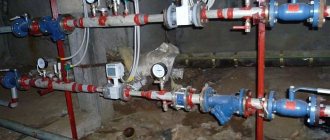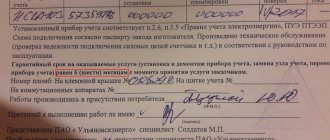Abbreviations
| MKD | Apartment house |
| ODPU | Household metering device |
| UUTE | Thermal energy metering unit |
| PU | Metering device |
| Rules No. 354 | Rules for the provision of utility services to owners and users of premises in apartment buildings and residential buildings (approved by Decree of the Government of the Russian Federation dated May 6, 2011 No. 354) |
| Rules No. 124 | Rules mandatory when a management organization or a homeowners’ association or a housing cooperative or other specialized consumer cooperative enters into contracts with resource supply organizations (approved by Decree of the Government of the Russian Federation dated February 14, 2012 No. 124 |
| Rules No. 1034 | Rules for commercial metering of thermal energy and coolant (approved by Decree of the Government of the Russian Federation dated November 18, 2013 No. 1034) |
| Rules No. 776 | Rules for organizing commercial accounting of water and wastewater (approved by Decree of the Government of the Russian Federation dated September 4, 2013 No. 776) |
| Heat Supply Law | Federal Law of July 27, 2010 No. 190-FZ “On Heat Supply” |
| Law on Water Supply and Sanitation | Federal Law of December 7, 2011 No. 416-FZ “On Water Supply and Sanitation” |
| Consumption standard | It is 0.016 Gcal/m2, approved by Decree of the Moscow Government dated January 11, 1994 No. 41 “On standards for the consumption of thermal energy and gas used to calculate utility bills” |
| Resolution No. 629-PP | Decree of the Moscow Government of September 29, 2016 No. 629-PP “On maintaining a uniform procedure for paying for utility services for heating in the territory of the city of Moscow and amending the Decree of the Moscow Government of January 11, 1994 No. 41” |
| Rules No. 808 | Rules for organizing heat supply in the Russian Federation (approved by Decree of the Government of the Russian Federation dated 08.08.2012 No. 808) |
| Connection rules | Rules for connection to heat supply systems (approved by Decree of the Government of the Russian Federation dated April 16, 2012 No. 307) |
The MA, as the person responsible for the maintenance of the common property of the house, is obliged to establish the ODPU
The court of first instance also found unfounded the management organization's argument that the obligation to install the ODPU in the house lies not with it, but with the supplier of the relevant utility resources. As the UO argued, it should not be held financially responsible for the inaction of the RSO. It is the water supplier who provides cold water services under direct contracts and must install communal meters.
The judge pointed out to the defendant that, according to paragraphs. “k” clause 11 of the RF PP No. 491, the maintenance of common property includes the installation and commissioning of ODPU, including cold water, and their proper operation.
According to Art. 3 of the Federal Law of July 21, 2007 No. 185-FZ and clause 2.4.2 of Rules No. 170, the installation of ODPU relates to major repairs of apartment buildings and is carried out at the expense of the corresponding fund.
At the same time, the common property must be maintained in a condition that ensures compliance with the requirements of the legislation of the Russian Federation on energy saving and increasing energy efficiency (clause “g”, clause 10 of the RF PP No. 491). The responsibility to ensure compliance with such requirements is assigned to the person responsible for the maintenance of the common property - the organization managing the house.
The court concluded that the MA, by virtue of direct instructions of the law and the management agreement, was obliged to organize the installation and commissioning of the ODPU. In particular, the company could contact RSO and conclude an agreement with it to carry out such work. The cold water supplier's claim was satisfied.
How Resolution No. 897 changed the procedure for interaction between the Authorized Organization and the RSO
312414
Who pays for the installation of the control unit?
As stated earlier, in order for the management company or the HOA to install the GPU, an appropriate decision of the general meeting of either the owners of the premises or the members of the HOA is required.
At the same time, the current housing legislation of the Russian Federation does not give the owners of premises the right to make decisions on entrusting the person managing the apartment building with the responsibility for installing safety equipment, without making a decision on the procedure for financing this type of work.
If the house is managed by a management company, the document regulating the relationship of the management company with the owners of premises in the apartment building is a management agreement.
In accordance with Part 2 of Article 162 of the Housing Code of the Russian Federation, “Under an agreement for the management of an apartment building, one party (the management organization), on the instructions of the other party (the owners of the premises in the apartment building...), within an agreed period for a fee, undertakes to perform work and (or) provide management services apartment building, provide services and carry out work for the proper maintenance and repair of common property in such a building...”
The MA is not a charitable organization, but a commercial legal entity that provides home management and maintenance of common property services to the owners of premises in apartment buildings solely for a fee. This statement is true, among other things, with regard to the installation of control devices.
In the case of managing a house by a HOA, the specified organization acts in accordance with the estimate of income and expenses approved by the general meeting of HOA members. And in the absence of work on installing the control center in this estimate, the HOA will not be able to carry out the specified work. If the specified work is taken into account in the estimate, it is the owners of the premises who must pay for this work.
Part 1 of Article 137 of the RF Housing Code establishes:
"1. The homeowners association has the right to:
2) determine the estimate of income and expenses for the year, including the necessary expenses for the maintenance and repair of common property in an apartment building, the costs of major repairs and reconstruction of an apartment building, special contributions and deductions to the reserve fund, as well as expenses for others established by this chapter and the articles of association of the purpose partnership;
3) establish, on the basis of the accepted estimate of income and expenses for the year of the partnership, the amounts of payments and contributions for each owner of premises in an apartment building in accordance with his share in the right of common ownership of common property in the apartment building.”
Based on the presented standards, it is the owners of the premises who are obliged to pay for the installation of the control center.
Law 261-FZ, which, as stated earlier, established the obligation of the owners of premises in an apartment building to equip the house with fire control equipment, indicates that if the owners have not fulfilled their obligation within the prescribed period, then they must provide access to the organization installing the fire control room to the installation sites of such devices and pay the costs of these organizations for the installation of these metering devices.
In this case, Part 12 of Article 13 of Law 261-FZ establishes:
“In case of refusal to pay expenses on a voluntary basis, a person who has not fulfilled the obligation to equip these facilities with meters for energy resources used within the prescribed period must also pay the expenses incurred by these organizations in connection with the need for compulsory collection. At the same time... citizens - owners of premises in apartment buildings who have not fulfilled the duties provided for in parts 5 - 6.1 and 8 of this article within the prescribed period, if this required the said organizations to take actions to install meters for metering the energy resources used, pay in equal installments within five years from the date of their installation, the costs of these organizations for the installation of these metering devices, provided that they do not express their intention to pay such costs at a time or with a shorter installment period. If an installment plan is provided, the costs of installing meters for energy resources used are subject to increase by the amount of interest accrued in connection with the provision of an installment plan, but not more than in the amount of the refinancing rate of the Central Bank of the Russian Federation in effect on the date of accrual.”
That is, property owners can be provided with payment in installments for five years. In this case, the cost of work and services is subject to increase (the percentage of increase should not exceed the refinancing rate).
If the owner refuses to pay the costs of installing the control unit at all, then payment for such costs will be forcibly collected from this owner, and in addition to it, the costs of forced collection will also be collected.
A similar rule on the obligation of the owners of premises to pay for the installation of fire control facilities is also contained in clause 38.1 of Rules 491.
Who equips MKD OPU?
Owners of premises in apartment buildings put into operation by November 27, 2009 were required to ensure that such houses are equipped with metering devices for used water, thermal energy, electrical energy, as well as putting the installed metering devices into operation before 07/01/2012, and for the Republic of Crimea and the city of Sevastopol - until 01/01/2019. Within the specified period, the apartment building had to be equipped with collective (common house) meters for used water, heat, electrical energy, as well as individual and general (for a communal apartment) meters for used water, electrical energy (Part 5 of Article 13 of the Federal Law of November 23 .2009 No. 261-FZ[1]).
Thus, equipping apartment buildings that were put into operation before November 27, 2009, with public safety equipment is the responsibility of the owners of premises in these houses.
If this obligation is not fulfilled by the owners, the houses are equipped with RSO meters. The owners must provide access to these organizations to the installation sites of metering devices, pay them installation costs and not interfere with the commissioning of meters.
When installing the control unit by the RSO, the law does not provide for mandatory agreement between the supplier of the metering device and its cost with the owners of premises in the apartment building who violated their obligation (Resolution of the AS SZO dated June 19, 2020 No. F07-2887/2020 in case No. A56-54793/2019).
Who should pay for the installation of communal metering devices - legal provisions
Payment for installation of ODPU - what is it? Absolutely any sphere of life of a citizen of the Russian Federation is regulated by the relevant legislative act.
As for the procedure for installing a common house metering device, in legal terms it is not so complicated, but it is filled with a considerable number of nuances.
Considering this topic from different angles, it may be necessary to refer to some Federal laws and the Housing Code of the Russian Federation (LC RF).
- All owners of private houses, apartments and other premises undertake to equip their homes with metering devices for all resources provided to them as housing and communal services. The entire process of carrying out work, operating and paying for the work is undertaken by the owner of the property. In the absence of an ODPU, the owner will be subject to an increased rate for payment of housing and communal services (up to 1.6 on the total amount payable) until the devices are installed (Federal Law No. 261 and 344).
- The owner undertakes to bear all costs of maintaining his home. And also participate in the process of paying for the costs of maintaining common property (applicable for apartment buildings) - Housing Code of the Russian Federation.
Who should pay for the installation of communal meters?
Based on the information presented earlier, it became clear that all costs for installing the ODPU are borne by the homeowner.
In the case where the house is private, the situation is extremely simple: its owner must contact the appropriate companies to organize the installation of the necessary meters, and after the work is completed, pay for them.
However, what should residents of apartment buildings do?
In this situation, payment issues are resolved in a slightly different way.
Secondly, it is necessary to raise the question of whether all residents of an apartment building agree to install a common meter. This practice is not mandatory, but after its implementation, all residents of the house will receive a number of privileges:
- full control of resource compliance with the norm;
- full control of the presence of any leaks on a general house scale;
- prevention of potential problems associated with leaks and other shortcomings with housing and communal services on a general building scale;
- the opportunity to significantly save on resources.
What is the role of the management company?
The management company, by virtue of its status, has comprehensive information about the share of each owner in the right of common ownership of common property and is vested with the authority to receive payments from the owners for the services provided by the management company and settlements with the RSO. Therefore, when managing a management house, it is this company, as an organization specially hired by the owners to resolve all general issues of managing an apartment building, that is the proper defendant in a claim for recovery of the costs of the RSO for installing the control center.
Thus, if the owners of premises in an apartment building choose a method of managing the forces of the management organization, the repayment of the debt arising in connection with the installation of the control center by the forces of the RSO is assigned to the management company, which acts in relations with such an organization on behalf of the owners of the premises and manages the houses as its main activity .
Accordingly, if the owners of premises in an apartment building managed by the management company do not reimburse the RSO for the costs of installing the control unit, the latter may appeal to the management company with a demand for payment of these costs, including in court, including a situation where the owners did not decide to install the device accounting.
According to the legal position set out in paragraph 2 of section. I Review of Judicial Practice of the Supreme Court of the Russian Federation No. 4 (2015) [3], the Criminal Code is the proper defendant in the claim of the RSO for the recovery of costs for the installation of a common house meter. This also applies to the situation when direct agreements have been concluded between the owners of premises in the apartment building and the RSO ( resolution of the AS SZO dated July 13, 2020 No. F07-6649/2020 in case No. A21-12656/2019 , dated January 16, 2020 No. F07-16413/2019 on case No. A21-15883/2018 [4]).
Local judges are guided by the outlined approach.
| Arbitration court | Judicial act |
| AS VSO | Resolution of June 28, 2019 No. F02-2522/2019 in case No. A19-13868/2015 |
| Resolution No. Ф02-1559/2019 dated 05/06/2019 on case No. A19-14588/2017, the transfer of which to the Judicial Collegium for Economic Disputes of the RF Armed Forces was refused by the RF Armed Forces Ruling dated 09/04/2019 No. 302-ES19-13998 | |
| AS ZSO | Resolution dated January 29, 2019 No. F04-6083/2018 in case No. A67-457/2018 |
| AS UO | Resolution dated March 24, 2020 No. F09-243/20 in case No. A76-19159/2018 |
| Resolution dated February 13, 2019 No. F09-9667/18 in case No. A76-29168/2016 | |
| AS SZO | Resolution dated May 14, 2020 No. F07-2653/2020 in case No. A21-12655/2019 |
| Resolution No. F07-2174/2020 dated 04/14/2020 in case No. A21-8519/2019, the transfer of which to the Judicial Collegium for Economic Disputes of the RF Armed Forces was denied by Ruling of the RF Armed Forces dated 06/30/2020 No. 307-ES20-8465 | |
| AS SKO | Resolution dated 02/07/2019 No. F08-11890/2018 in case No. A32-747/2018 |
RSO does not have the right to file a claim for reimbursement of expenses against the owner of the premises, including non-residential ones, in the apartment building, which is managed by the management company ( resolution of the AS PA dated January 28, 2019 No. F06-41612/2018 in case No. A12-784/2018 [5] , dated 03/06/2018 No. F06-30108/2018 in case No. A12-17023/2017 , dated 07/08/2016 No. F06-10353/2016 in case No. A57-611/2015 ).
The amount of the management company’s obligation to reimburse the costs of installing the control center should not exceed the total amount of obligations of the owners of premises in the apartment building. This is due to the fact that the management company acts in the matter of reimbursement of expenses for the installation of the control center exclusively as a person mediating relations between the RSO and the owners of premises in the apartment building and is deprived of the opportunity to receive funds for these purposes other than from these owners.
Therefore, the RSO can submit for collection from the management company the debt to pay the cost of installation of meters, taking into account the interest accrued for installment reimbursement of expenses ( resolution of the AS SZO dated May 20, 2020 No. F07-3004/2020 in case No. A21-11715/2019 [6] , dated March 26, 2020 No. F07-998/2020 in case No. A21-7348/2019 , AS Far Eastern Military District dated October 17, 2019 No. F03-4612/2019 in case No. A51-12061/2018 ).
The costs of installing the control center are subject to reimbursement by the management organization that services the apartment building on the date of the RSO's request for compensation for the costs of installing metering devices, and in the part not paid by the owners of the premises.
Let us emphasize: RSO is suing the management company involved in managing the house on the date of the appeal for the collection of the entire amount of debt, including that incurred before this company began managing the house ( resolution of the AS SZO dated April 16, 2020 No. F07-2783/2020 in the case No. A56-92184/2019 , AS SKO dated 04/01/2019 No. F08-1564/2019 in case No. A32-53245/2017 , AS VVO dated 10/23/2019 No. F01-4558/2019 in case No. A28-8259/2018 ).
This is due to the fact that the legislation does not provide special rules for exercising the right to reimbursement of expenses for the installation of control facilities in the event that the owners change the form of management of the house or change the management company ( Resolution of the Supreme Court of the Russian Federation dated December 5, 2019 No. F01-6387/2019 in case No. A82-12650/ 2018 [7]). A change in the management company (a circumstance that does not depend on the will of the RSO) should not entail a break in the calculation of interest for the RSO as an entity that is legally required to equip apartment buildings with metering devices and which has the right to compensation for costs incurred ( Resolution of the Supreme Court of the Russian Federation dated September 17, 2019 No. F01-4147/2019 in case No. A28-7759/2018 ).
Classification of common house heat meters
Heat metering equipment, although it performs the same function, uses different operating principles, has its own design features, and requires compliance with certain specific installation and maintenance requirements.
Therefore, you not only cannot select a common house meter yourself, but also have no right. Only competent specialists from the relevant organizations will be able to accurately determine which type of devices is optimal in specific conditions, recommend a trusted supplier, and calculate the required amount of additional equipment.
It is useful to know that the following types of meters are used in housing and communal services:
- tachometer;
- electromagnetic;
- vortex;
- ultrasonic.
Tachometer meters are the simplest budget option. They are equipped with mechanical water meters and a heat meter. Their cost is significantly lower than other metering devices. The main disadvantage of such equipment is problematic operation in conditions of increased water hardness. The filter will often become clogged, and this will naturally weaken the pressure of the coolant: a dubious benefit is obvious. Therefore, tachometer meters are usually chosen for private sector houses and apartments. A huge advantage of mechanics is the absence of all kinds of electronic components, which allows the device to function even for a long time in unfavorable conditions (humidity, dampness).
The correct operation of a common house heat meter is influenced by factors such as the purity of the liquid in the system, pressure uniformity, and the microclimate of the room in which the measuring device is installed.
Electromagnetic devices are an affordable solution that guarantees high-quality measurement accuracy with high-quality installation and periodic qualified maintenance. Suitable for areas with good water quality, since metal impurities in it can distort the reliability of the device's readings - upward.
Vortex meters can be easily mounted on both horizontal and vertical sections of a pipeline, display correct readings under any conditions, and have a radio interface that helps identify faults and take readings remotely - this is probably why service organizations speak very positively about them and recommend them, for the most part , to install them.
Although ultrasonic metering devices are highly accurate and modern, in practice they do not demonstrate particularly high reliability - due to poor water quality, they often quickly fail. In addition, this equipment is very sensitive to welding currents.
Like any other measuring device, a common house heat meter is subject to mandatory periodic verification. Both the service life of the equipment and the objectivity of the figures in housing and communal services bills depend on the quality of service
Self-replacement of the electricity meter
The question often arises whether it is possible to replace the electric meter on your own. If the owner is a specialist in this field, then in principle this is not prohibited.
Important here will be:
- strict adherence to safety rules;
- in the absence of professional skills, installing the meter yourself is prohibited;
- written approval of the resource supplying organization;
- inviting a specialist to remove the seal from the old device, and after installing the new one to seal it.
Let's talk about replacing the electricity meter yourself step by step:
In this case, you should take into account some points and follow a certain procedure.
- Write an application to Energosbyt explaining the reasons for replacing the meter and obtain permission for it. Bring with you a passport and documents confirming ownership (extract from the Unified State Register of Real Estate).
- Immediately ask all the necessary questions about the meter models. Select the type of meter, depending on the tariff plan. The model must be certified and contained in the Register.
- It is better to purchase an electric meter from the company that supplies electricity. Buy a metering device. For example, many people are now buying multi-tariff ones, which allow significant savings, since the tariff is much lower at night. It must comply with the technical specifications required by the energy sales organization. To buy a meter, you will need to present a certificate; without it you cannot make a purchase.
- At the appointed time, they will send a specialist who will record the removal of the seal from the old device.
- The old meter is dismantled in compliance with safety rules. It will need to be saved for final readings. While the meter is absent, for this period the average tariff for the last 3 months will be charged.
- Install a new meter and check its operation.
- Write an application to invite an inspector who will check the installation and seal it.
After replacing the electric meter, the owner of the apartment is issued a sealing certificate.
Important! It is necessary to keep the passport with the technical characteristics of the device, which contains data on the service life. Since it will be useful in the future, the next time you replace the meter
What is the price? The cost of electricity meters starts from 800 rubles and depends on the technical characteristics. Work to replace the meter is determined by the region from 1 - 2.5 thousand rubles.
Common house metering devices
To begin with, it is worth noting that the decision to install collective accounting equipment in apartment buildings was made back in 2009. This rule was enshrined in the Law “On Energy Supply and Increasing Energy Efficiency”. However, the rule itself began to apply in mid-2012.
The law establishes that the installation of such devices is not mandatory, but is advisory. Thus, those who live in apartment buildings can install such equipment at their own discretion.
Cold water
To install common metering equipment for the entire house to account for cold water consumption, it is necessary that the water supply system in the house be unified. So, if part of the living spaces in the house is supplied with water from another system, then the device will not be installed.
Although from an engineering point of view the problem is considered solvable, from a legal point of view a conflict arises between the decision of the residents themselves and the position of the utility organization. As a rule, if a house is provided with water from two or more water supply systems, then several utility organizations provide this service.
In this situation, keeping a general record of water consumption in the entire apartment building will be problematic. The most important thing is to choose a suitable water meter.
Hot water
With hot water, when installing a hot water meter for the whole house, the problem is approximately the same. The peculiarity is that the supplying utility organization keeps a record of the hot water at the outlet.
Thus, it is necessary to check with the utility organization whether hot water is metered at the outlet, because in this case, installing common house metering equipment will lose its meaning.
On the other hand, residents will be able to use such a device to check the accuracy of the receipts sent to them.
General house heat metering devices
To account for thermal energy, no TDPU of thermal energy was established. As a rule, the obligation to pay for heat is fulfilled in accordance with the standards established by the relevant regional authorities.
These standards are calculated for the area of each heated room, which is what amounts to payment. Thus, it seems impossible to carry out a general accounting of thermal energy in an apartment building, since not all rooms in it are heated.
However, the law establishes that now thermal energy consumption will be taken into account using metering equipment installed at the energy unit.
Electricity
Maintaining general electricity metering is much easier than with other types of utilities. So, no matter how many sources of electricity are connected to the house, general metering can be carried out simply by drawing a common line through them all.
At the same time, residents bear an additional burden in the form of additional payments for electricity. After all, electricity tends to be consumed when transmitted through wires. So the discrepancies in the readings of the general meter and the total readings of all residents' meters will be large.
Another question is who exactly will pay for this discrepancy? Who is the obligated person?
Maintenance and testing of metering devices
After the installation of a common house meter is completed, it will need to be inspected by the state every 4 years. Additionally, to ensure durability, accuracy of readings and efficient operation of the equipment, maintenance of the devices is carried out.
Most often, for control, a maintenance and repair plan is drawn up, which involves timely replacement of filters and device elements. It is important that all types of work must be carried out with the participation of the resource supply organization. This should also be controlled by the management company or HOA.
The procedure for registration and installation of the meter
So, in what sequence should the heating system of an apartment building be equipped with a meter if it was not installed immediately during construction?
The first step should be a house-wide meeting - it is most often organized by representatives of the management company. At the meeting, a decision is made to install a heat meter and the type of device is selected. Then representatives of the residents of the house or the management company contact an organization that has the appropriate authority and is engaged in the supply and installation of heat metering devices.
Further work is carried out in the following order:
- A project is being drawn up to integrate the meter into the heating system of the house.
- The management company, having studied the draft, gives its consent to the installation work.
- Next, in accordance with the project, the device is installed into the system.
- After this, it is mandatory to test the operation of the device with the preparation of documentation from the installer company.
- Finally, a representative from the heat supply company is called, who will seal the meter and draw up an act for its registration. And only after official registration the device becomes the basis for further calculations for the heat consumed by the house.
If all of the above measures are not carried out, and the meter is not officially registered, then its data will not be considered legitimate and will not be indicated in receipts for heating payments.
Some factors affecting the operation of the device
During the operation of the meter, the quality of its operation may be influenced by external factors, on which the accuracy of the readings sometimes depends.
The matter does not end with the installation of heat consumption metering devices - they require regular checking, adjustment, and preventative maintenance.
The most common influencing factors today are:
- High coolant temperature can partially or completely damage the metering device. Although, it was originally designed for such operating conditions. But the quality sometimes lets you down.
- The formation of scale on the internal walls of the pipeline reduces the diameter of the pipe, and as a result, the passage of water flow becomes difficult. In this regard, some meters stop giving real readings - as a rule, they change upward.
- Failure to ground the pipeline leads to the formation of an electric charge inside the pipeline, which also causes errors in the meter readings.
- Contaminated coolant, as well as gas bubbles suspended in water, are a negative factor for all types of metering devices, as they affect the correctness of the readings. To eliminate errors, it is necessary to install protective filters in front of the meter.
- Pressure drops in the heating system can also distort the meter readings.
- Layering of sediment in the cavity of the device itself. In a tachometer meter, the presence of sediment reduces the readings, but in all others, on the contrary, it increases it.
- Electronic equipment malfunctions under the influence of high humidity and temperature changes in the room where the metering device is installed.
It should be noted that all of the above points - choosing a meter, monitoring its operation, as well as negative factors affecting the accuracy of its readings - affect each of the residents of the house, affecting the amounts payable. Therefore, after putting the heat meter into operation, all residents will have to be attentive to possible failures in the heating system, as they will most likely affect the meter readings. If problems arise, you must immediately call the service company’s specialists to carry out preventive maintenance.
And what even a temporary failure of metering devices can lead to is shown very clearly in the video we offer:
Why install public meters?
Federal legislation obliges owners to install communal water meters in all apartment buildings. If there is no meter, the management company can charge a fee at the average rate. And it is barbaric, especially since local governments are given the right to independently regulate prices for water consumption.
If, for example, a water leak occurs on a water pipeline outside a residential building, the volume of liquid spilled onto the ground will be proportionally divided between the tenants “sitting” on this pipe and recorded in the “common house needs” section.
Central communal heating meter: who should install it and why?
The installation of communal meters is mandatory, which is stipulated in the articles of legislation. Heating meters in apartment buildings will not be installed in the following cases:
- the building is classified as dilapidated or in disrepair;
- the cost of equipment and its installation exceeds the amount of utility bills at home (for heating) for six months.
The Housing Code of the Russian Federation establishes that all property of a house is divided into personal and general. Personal property inside apartments and its safety falls solely on the shoulders of the homeowners. Common building amenities are located in shared areas (floors, elevators). Each owner and tenant of real estate (under a social or commercial tenancy agreement) undertakes to take care of the joint property and its safety.
The operation of communal heat meters performs a number of important functions, but does not guarantee large savings on utility bills.
Reducing costs depends on the owners and users of real estate themselves.
Purpose of a collective meter
Common house meters are installed in apartment buildings for the following purposes:
- management companies can control the actual consumption of resources;
- establishing fair payment based on resources used;
- developing a sense of economy among citizens (heat energy consumption and future payments will depend on the serviceability of doors and windows in the entrances).
The legislative framework
The design of the heating system, the procedure for taking readings, the rules for paying money for utilities are established by the articles of the following regulatory legal acts:
- Housing Code (fixes the distribution of common and individual property, and also obliges citizens to maintain both types of property equally);
- Federal Law “On Energy Saving” No. 261 (establishes the mandatory installation of communal meters in apartment buildings).
There are also local orders and acts that utility services and management organizations follow when forced to install numeric devices.
Who should install the device?
The procedure can be initiated by the owners of apartments in the building themselves or by the management company. Depending on the procedure, the algorithm will be as follows:
- organizing a house-wide meeting of owners and submitting for consideration the issue of installing heat meters;
- voting (to satisfy the decision you will have to collect the required percentage of positive votes);
- calculation of cash expenses (the management company can take money from the account for major repairs);
- if the available financial reserves are insufficient, then the meeting considers the issue of additional donation of funds for the installation of meters;
- The management company attracts third companies to the events that have a license to carry out work on installing public meters.
How much does installation cost?
The cost of communal heating meters is compensated by the apartment owners themselves. It can be:
- individuals who have received property rights on the basis of a legal agreement (purchase, gift, inheritance);
- legal entities, if the premises are used for business activities;
- IP;
- municipality, when the property is transferred to the temporary use of a family on the basis of a social rental agreement.
The cost of a common house appliance will vary between 50-500 thousand rubles per apartment building. The final price depends on the following factors:
- the locality in which the apartment building is located;
- competition;
- building area divided into private and shared squares;
- complexity of installation work;
- quality of materials used.
Maintenance of common house heat metering devices
Monitoring the serviceability of common house thermal energy metering devices is carried out:
- management company;
- housing and communal services inspector;
- representative of the company that installed the meters.
Expert opinion Mironova Anna Sergeevna Lawyer of a wide profile. Specializes in family issues, civil, criminal and housing law
The commissioning of a common house meter is impossible without the presence of a heating service provider in the house. A specialist from the provider must establish the serviceability of the meter, as well as seal it, recording the current readings. The utility provider does its own regular meter checks.
Maintenance includes a list of the following functions:
- regular inspection of the device for mechanical damage;
- monitoring the serviceability of mechanisms;
- no idle speed;
- recording readings from a common house meter.
Additional technical information
- If the heat consumption is insignificant, and the heating system has a high pressure, the installation of inexpensive mechanical meters is allowed. When, on the contrary, the flow rate is significant and the pressure is small, the consumption of thermal energy will be recorded more accurately by an electromagnetic or ultrasonic device. By the way, most of the installations include house-wide ultrasonic devices.
- In addition to heat, metering devices record the consumption of hot water; now modern device models count coolant with a temperature of less than 40 degrees as cold, which is reflected in the amount of payment for heat supply.
- A useful measure for an apartment building would be to conduct an energy audit to identify the causes of heat loss. Then measures should be taken to eliminate them. Of course, such work will be expensive.
- When it is decided to install a mechanical meter, in addition to installing coarse filters, it is necessary to use a magnetic-mechanical filter in steel pipes to retain scale and rust. It is capable of filtering out metal particles that are so small that they pass through the mesh.
Date: September 25, 2021
Timely payment for services
Installing metering devices really helps to obtain more accurate data on energy consumption. As a result, the cost of maintaining housing and other premises can be reduced, even if it is a small amount. At the same time, do not forget about making the required payments on time.
On the “Payment for Government Services” website you can pay for utilities online without commission. All you need for this is your receipt details, service provider or personal account number. The system will search for the debt, and you will be able to pay it immediately. To do this, you can use VISA, Maestro, Mastercard and Mir bank cards.









